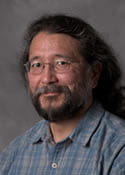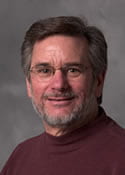Faculty
 Mark Hay
Mark Hay
Co-Director, Aquatic Ecology Center, Regents Professor, and Harry and Linda Teasley Chair in Environmental Biology
mark.hay@biology.gatech.edu | 404-894-8429
I’m an experimental field ecologist that also investigates the underlying chemical mechanisms generating the patterns I find in the field. Most of our work is focused on tropical coral reefs, but we are also working in freshwater lakes and streams, and sometimes using terrestrial data to test the robustness of general patterns and processes we initially detect in aquatic systems. The majority of our research focuses on plant-herbivore and predator-prey interactions, and on the ecological and evolutionary cascades of indirect effects that are caused by prey chemical defenses. We are also increasing our emphasis on using basic ecological and evolutionary investigations to facilitate management, conservation, and restoration of aquatic systems, with a special emphasis on tropical coral reefs.
 Julia Kubanek
Julia Kubanek
Co-Director, Aquatic Ecology Center, Professor and Associate Dean, Schools of Biological Sciences and Chemistry & Biochemistry
julia.kubanek@biology.gatech.edu | 404-894-8424
Chemical ecology; Chemical communication/ chemical signaling; marine natural products chemistry; secondary metabolism; harmful algal blooms; plankton ecology Research in Professor Kubanek’s laboratory explores mechanisms of chemical communication and signaling in aquatic environments. Using both chemical and biological experimentation in the laboratory and at field sites around the world, we examine the ecological roles and consequences of plant and animal natural products.
 Facundo Fernandez
Facundo Fernandez
Associate Professor and Vasser Woolley Foundation Chair in Bioanalytical Chemistry, School of Chemistry & Biochemistry
facundo.fernandez@chemistry.gatech.edu | 404-385-4432
Bioanalytical Mass Spectrometry: Fundamentals, Instrumentation and Applications Research in the Fernandez Lab focuses on the development of novel bioanalytical mass spectrometric instrumentation and methods to solve complex biomedical and environmental questions. The experiments involve state-of-the-art mass spectrometry, ion mobility spectrometry, new types of ion sources (DART, DESI, AP/MALDI, MEMS, high-speed liquid chromatography, and the mining of the obtained data using chemometric tools such as multivariate calibration, classification and genetic algorithm variable selection.
 Joseph Montoya
Joseph Montoya
Professor, School of Biological Sciences
joseph.montoya@biology.gatech.edu | 404-385-0479
The Montoya lab group works at the interface between biological oceanography and biogeochemistry, with a strong focus on the role of nitrogen cycle processes in structuring the flow of biomass and energy through marine ecosystems. My research program is highly interdisciplinary, incorporating work in biological oceanography, marine chemistry, and isotope biogeochemistry on a variety of temporal and spatial scales.
 Terry Snell
Terry Snell
Professor and Elizabeth Smithgall Watts Chair in Animal Behavior and Conservation
terry.snell@gatech.edu | 404-385-4498
Chemical ecology of zooplankton; mate recognition; evolutionary ecology; aquatic toxicology; gene expression in response to environmental stress; aquaculture. Professor Terry Snell and his laboratory team are investigating mate recognition in zooplankton and the response of aquatic animals to anthropogenic stress. Research efforts focus on identifying genes that are involved in chemical communication between male and female rotifers and genes that are differentially expressed in aquatic invertebrates upon toxicant exposure.
 Frank Stewart
Frank Stewart
Associate Professor, School of Biological Sciences
frank.stewart@biology.gatech.edu | 404-894-5819
Genome evolution and ecology of microbial symbioses * functional diversity and gene expression in natural microbial communities * molecular evolution through microbial genomics * marine microbiology. We are particularly interested in how microbial genome evolution and physiology are affected by symbiotic interactions with higher taxa. In tandem with this work, we study free-living microorganisms, as they provide important reference points for understanding symbiont biology and mediate key global biogeochemical cycles in the ocean’s water column and sediments.
 Donald Webster
Donald Webster
Professor and Associate Chair for Finance and Administration, School of Civil and Environmental Engineering
dwebster@ce.gatech.edu | 404-894-6704
Dr. Webster’s interests are in experimental fluid mechanics, focusing on environmental flows and on the influence of fluid mechanics on biological systems. Research objectives have been pursued in two basic ways: studying the fluid mechanics and turbulence characteristics of environmental and biological flows; and developing advanced experimental techniques and facilities necessary to conduct the research.
 Howard (Howie) Weiss
Howard (Howie) Weiss
Professor, School of Mathematics
weiss@math.gatech.edu | 404-385-2134
I work with bioscientists to create mathematical models to study how populations change and how infectious diseases are transmitted through a population. We take a mechanistic, multiscale “systems biology” approach to modeling. As a mathematician, I also analyze the dynamics of such models, always searching for new mathematics (which I frequently find). Current group research projects include modeling the fish biomass structure at coral reefs and studying the how fishing degrades a reef, modeling the transmission of an infectious disease mediated by a water reservoir (e.g., cholera), modeling competition and growth of bacterial colonies on surfaces, and modeling the competition of flu viruses.
 Marc Weissburg
Marc Weissburg
Professor, School of Biological Sciences
marc.weissburg@biology.gatech.edu | 404-894-8433
Chemical ecology: chemically-mediated orientation and guidance in marine invertebrates, behavioral strategies for orientation in relation to fluid flow in aquatic environments, predator-prey and mating behavior mediated by chemical cues. Sensory ecology and physiology: sensory physiology of chemo- and mechanoperception in marine crustaceans, development of chemosensory systems, neuroanatomy of crustacean chemosensory and mechanosensory systems, signal structure and transmission of chemical and fluid mechanical signals.
 Joshua Weitz
Joshua Weitz
Professor, School of Biological Sciences
joshua.weitz@biology.gatech.edu | 404-385-6169
Theoretical ecology; evolutionary ecology of microbial & viral communities; biological networks; vascular plants; scaling laws; disease dynamics; interacting particle systems.

Jeannette Yen
Professor, School of Biological Sciences
jeannette.yen@biology.gatech.edu | 404-385-1596
Small-scale biological-chemical-physical interactions in the plankton, especially the behavior and signal recognition by marine zooplankton: fluid physics of signal structure, neurophysiological basis of signal detection, consequences on feeding ecology, functional morphology, biochemical composition, and reproductive strategies – of marine plankton, especially copepods, from tropical to polar oceanic regions. My research in biological oceanography and zooplankton ecology investigates signal recognition by planktonic copepods in a transitional fluid regime and their capability for three-dimensional information processing. I am interested in determining how these aquatic microcrustaceans are able to discriminate biological signals from background small-scale turbulent fluid flow.
